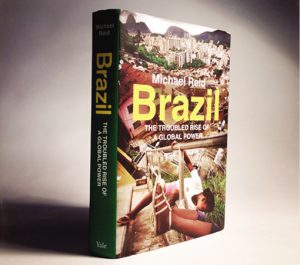Monday Memo: Ecuador Amendments — P&G Tax Fraud — Brazil Solar Parks — U.S. Midterm Elections – Colombia Paramilitary Sentenced
This week’s likely top stories: Ecuador’s National Assembly dismisses referendum on controversial constitutional amendments; Argentina suspends Proctor & Gamble for fiscal fraud; Brazil grants contracts for 31 new solar parks; U.S. gears up for midterm elections and immigration reform; Colombian court sentences AUC paramilitary leader to 8 years. Ecuador’s National Assembly Strikes Down Referendum on … Read more
Argentine Congress Passes Energy Bill, Opens Door for Shale Gas Development
Argentina’s Chamber of Deputies passed a bill yesterday that updates the country’s 47-year-old hydrocarbon law. The bill, which has President Christina Fernández de Kirchner’s support and has already been approved by the Senate, would ease foreign investment in energy exploration and production. Significantly, it includes regulations for off-shore and shale gas production—categories that were not … Read more
Medical Marijuana Planted in Chile
In a pilot pain prevention program, the municipality of La Florida planted the first marijuana seeds for medical use in Chile on Wednesday. Once the marijuana plants have been cultivated, oil from the plants will be used to treat 200 selected patients as part of a clinical study on the effect of cannabis as a … Read more
Uruguay’s Frente Amplio Outperforms Expectations Ahead of Runoff
In a presidential contest that may have seemed like déjà vu, Uruguay’s elections on Sunday produced some unexpected headlines: former President Tabaré Vázquez earned nearly 48 percent of the vote—a full 17 points ahead of challenger Luis Lacalle Pou; Vázquez’ center-left Frente Amplio coalition (Broad Front–FA) has retained its parliamentary majority; and a plebiscite to … Read more
Dilma’s Hipster Glasses
What do the Brooklyn hipster and the Brazilian president have in common? They both think they look good in a pair of oversized, black-framed glasses. Sometimes called “hipster glasses” in the United States and óculos setentas (70s glasses) in Brazil, these trendy frames have proven to complement both skinny jeans and struggling presidents in need … Read more
Dilma Redux?
The re-election of President Dilma Rousseff as president of Brazil was not a foregone conclusion as little as a week ago. While the campaign could not have been dirtier, with charges of corruption, womanizing and wife-beating flying around, Rousseff’s Partido dos Trabalhadores (Workers’ Party—PT) now seems set for another four years in office. The PT … Read more
Monday Memo: Brazil Elections – Uruguay Elections – Citgo Petroleum – Protests in Haiti – Chiquita
This week’s likely top stories: Brazil’s President Dilma Rousseff is re-elected; Uruguayan elections move to a second round; Venezuela scraps the sale of Citgo Petroleum; Haitians protest a lack of elections; a Brazilian consortium acquires Chiquita. Dilma Rousseff Re-elected President of Brazil: Brazilian President Dilma Rousseff was narrowly re-elected on Sunday in a runoff election … Read more
Rousseff Wins a Second Term, Promises Dialogue
Last night, President Dilma Rousseff was re-elected to Brazil’s presidency in one of the most contested elections in the country’s history. According to the Supreme Electoral Tribunal (TSE), Rousseff won with 51.57 percent of the vote. Partido da Social Democracia Brasileira (Social Democratic Party—PSDB) challenger Aécio Neves lost by less than 3 points, with 48.43 … Read more
In Brazil, Every Vote Counts
Misael Gomes stood under the hot sun in downtown Curitiba, sweat running down his back as he gathered with hundreds of Partido dos Trabalhadores (Worker’s Party—PT) supporters awaiting President Dilma Rousseff as she made an October 17 campaign stop ahead of this Sunday’s election. “We’re doing our work,” Gomes said to me, “we’re fighting hard … Read more
Argentine Bishop Urges Faithful to Assist in Search for Dirty War’s Kidnapped Children
The President of the Episcopal Commission for Social Pastoral Work in Argentina, Bishop Jorge Lozano, issued a call on Wednesday urging the country’s faithful to share information they may have regarding the fate of the children kidnapped during Argentina’s “Dirty War.” In the document, Bishop Lozano notes that, “There has been a network of silence … Read more

Fresh Look Reviews
Fresh, unique perspectives on recent books from across the hemisphere originally published in English, Spanish and Portuguese.
Why There’s No Nate Silver in Brazil
Even famed statistician Nate Silver couldn’t have forecast the first-round results of Brazil’s presidential election, which heads to a final runoff vote this Sunday. And not just because the campaign has unfolded with Dickensian complexity—down to the colorful cast of characters, tragic death, and political rebirth. From a scarcity of polling data to the very way elections are held in Brazil, … Read more
Hostages Released in Paraná Prison Standoff
After a 48-hour uprising, inmates at Guarapuava prison in the Brazilian state of Paraná yielded to authorities yesterday and released the 13 hostages that were being held in protest of poor prison conditions. Authorities reached an agreement with the prisoners, complying with at least one of their requests to move 29 inmates to a different … Read more
Why Brazil Lacked Faith in Marina Silva
At the front of one of Paraná’s largest Pentecostal churches, beneath a ceiling of glowing neon tiles arranged in the pattern of a giant cross, are two ornately framed pictures: one is of a new $300 million, 10,000-seat temple in São Paulo, and another is of a future $122 million, 5,000-seat structure here in downtown … Read more
Monday Memo: Brazilian Elections – Gay Marriage – Renewable Energy – Missing Mexican Students – Peruvian Elections – Mining in Argentina
Brazil’s presidential elections lead to runoff: As predicted, Brazilians will return to the polls on October 26 to vote for president in a second round of elections—but in a last-minute surprise, challenger Aécio Neves of the Partido da Social Democracia Brasileira (Brazilian Social Democracy Party—PSDB) will face Brazilian President Dilma Rousseff. In Sunday’s first-round election, … Read more


